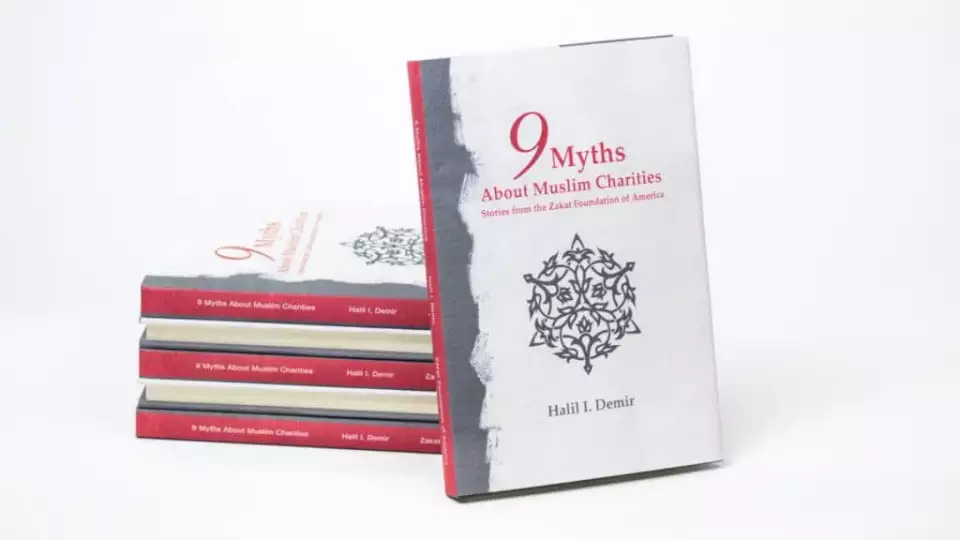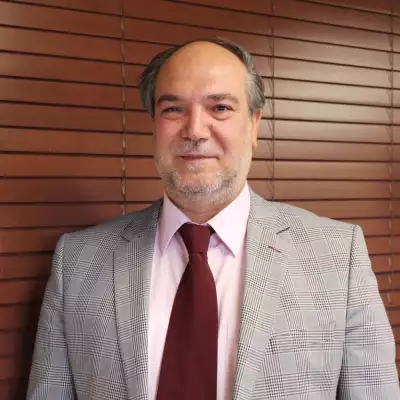
Purchase the book!
Click to Purchase on Amazon.com Paperback $20.00
Halil Demir
Internationally recognized humanitarian and influential global leader Halil Demir (pronounced like the Arabic name Khalil) has dedicated his life to giving voice to the unheard, delivering hope to the distressed and imploring for peace in some of the world’s most challenging places. Having experienced first-hand the horrors of radicalism and upheaval, he brings authenticity, humility and grace to his tireless work.
Demir fundamentally understood that a collective effort to directly and strategically deliver resources, education, and services to distressed and often-overlooked communities could be transformative. Fueled by that vision, he launched Zakat Foundation of America.
In the nearly two decades since founding Zakat Foundation of America, Demir’s work has drawn him to the front lines, where he connects with children, women and men — the refugees, the displaced and the disenfranchised — who hunger not only for basic needs, but for hope, justice and peace. He instinctively understands that hope and empowerment are powerful forces against radicalism.
Fear and mistrust surround Muslim charities in American society. This is neither natural nor an accident.
The fearful and mistrusting take advantage of misconceptions to strengthen anti-Islam laws and tactics in the nonprofit sector. They panic Americans into frighteningly accepting repressive practices and regulations that compromise their native human compassion, their personal freedoms to act on it, and their vested right as this republic’s moral authority.
In this book are stories from Zakat Foundation of America’s founding director unraveling blatant myths and fallacies about Islam — and charity — from its defining sources, showing us what’s at stake if we continue to let partisans with self-serving agendas trick us into acting on these fears.
These nine myths function like school-ground rumors, spreading with reckless abandon and infesting our society with hate for Muslims and, by extension, Muslim charities. The consequences are far-reaching, hurting American interests.
But the most victimized are the millions — in Chicago, throughout the United States, and around the world — who could be receiving aid but are being deprived. Without countering these targeted myths and the greater agenda behind them, Zakat Foundation of America and humanitarian organizations like it will be forever held back from aiding and uplifting the indigent.
This book is a critical read for all who work in, donate to, or concern themselves with the giving world. And anyone who wants to know what moves Muslim charities, the daunting risks their people take, the courage and foresight they display, the crucial link Muslim charities now represent in the global humanitarian chain, and the choices that will determine who we are as an American people.
Click here to listen to a sample of the book
1ST MYTH: AMERICAN MUSLIM CHARITIES ARE TREATED LIKE OTHER CHARITIES
WHEN JESUS SAW the crowds, he went up the mountain; and after he sat down, his disciples came to him: Then he began to speak, and taught them, saying:
“… Blessed are you, when people revile you and persecute you and utter all kinds of evil against you falsely, on my account. Rejoice and be glad, for your reward is great in Heaven, for in the same way they persecuted the prophets who were before you.”
(New Revised Standard Version, Matt. 5.1-2, 11-12)
The Transfer
It’s early Friday morning, September 22, 2006. I get a phone call from our bank saying I must come in immediately. The bank has said it cannot execute a crucial wire transfer I’ve sent to help Afghan refugees in Pakistan.
I’m hoping to clear this up quickly. Local food suppliers need to get paid before our people can distribute the provisions among a desperate population. Because it’s Friday, and I need to make the congregational prayer by 1 p.m.
I’m at the bank by 9:15 a.m. A bank officer who knows me ushers me into her office and sits me down. I ask her about the transfer problem. “Well, Mr. Demir, our bank cannot make the transfer because Pakistan is not a country.”
I’m momentarily stunned into silence. Is she giving me an early morning ribbing to lighten things up? No laugh. Her straight face shows no trace even of a smile.
“Uh. Ms. … I – well – you see – Pakistan is a country. I –.”
“No. Pakistan is not a country, and we can only send wire transfers to recognized countries.”
I’m dumbstruck. Did something happen today to Pakistan? Did it renounce its nationhood? Change its name? Was the entire country raptured? Evangelicals were right after all. Did it just vanish? Is this one of those dreams where next thing you know I look down and I’m still in my pajamas? What?
“Uh. You know, Ma’am. Pakistan, you know, is a country. It’s right over there by those other Stan countries: Afghanistan. Tajikistan. Uzbekistan. Right above India on the map. Next to Iran. A little bit by China. Well, it doesn’t border Tajikistan, really, there’s this little strip — ”
“I’m sorry, Mr. Demir. Pakistan is not a country. We can’t send money to a place that does not have proper national channels, you understand.”
“No, Ma’am. Honest. We actually have done so much good relief work in Pakistan. It is a country.”
“No. It doesn’t appear on our list of countries, the ones we recognize. We can only transfer to recognized countries.”
“No. Ma’am. Really. Pakistan is part of the United Nations. It’s actually a big country, lot of people.”
At that moment — I swear this is the truth! — she has this television going, high up on the wall, and who comes on it? Here walks up President George W. Bush, on screen, in a press conference. And who strides up next to him? Pervez Musharraf, then-president of Pakistan. (Does he know his country has gone missing?)
It’s a miracle! A sign! Problem solved!
“There! You see? That man on the left, next to President Bush. He’s president of Pakistan. The country.”
“I’m very sorry, Mr. Demir. I know what you’re trying to say, but I don’t make these lists. Just, Pakistan isn’t a recognized country. So we can’t send your wire. I’m sorry.”
“No. Wait. You see that green flag, next to the American flag, has like a crescent moon on it? That’s Pakistan’s flag, the country flag. The two presidents are meeting, the two countries.”
Bush is talking. He’s saying the word “Pakistan” again and again.
“My hands are tied, Mr. Demir. It’s not in my control. Let me put you in touch with the department that handles our wire transfers.”
She makes the call.
“Oh? Oh. Oh, I see.”
Hangs up.
“I’m sorry, Mr. Demir. (Laughs) Pakistan is a country. (Laughs again) That wire transfer’s fine. It’s the Palestine one that has the problem.” It’ll be a long morning.
We’ll continue our book tour soon. Please check back often!
“There are many misconceptions about Muslim American philanthropy and especially Muslim American humanitarian organizations. This book is an important contribution that provides readers a clearer understanding of how nonprofit professionals on the front lines have to deal with prejudice, bigotry and ignorance while furthering their social good missions. This book provides us a critical perspective from the front lines of Muslim American philanthropy that pushes back against misconceptions about philanthropic action in the Muslim community in America.” —Shariq A. Siddiqui, JD, PhD, Director and Assistant Professor, Muslim Philanthropy Initiative
Halil Demir combines storytelling with research to explain how Muslim charities really work. In the process, he dispels harmful myths with facts, compassion and humor. The writing and important work it describes reflect the inherent humanity of Islam.” —Kay Guinane, JD, Director, Charity & Security Network
“‘9 Myths About Muslim Charities: Stories from the Zakat Foundation of America’ fills a major gap in understanding Muslim charity in general. Had a similar work been available before 9/11, it’s quite possible that more Americans would have understood the practice of Muslim charity better. It would have made selling the insidious narrative curated less effective by closures of Muslim charities right after 9/11, and many accused may have received fair trials in the courts. Nevertheless, generating more of such literature should be an ongoing effort by all, but especially by organizations and institutions that collect zakat and other charitable funds from Muslims and make this world a better place for all.” —Rasheed Ahmed, Executive Director, Center on Muslim Philanthropy
“We accept stories that have no basis in truth. Halil I. Demir’s ‘9 Myths About Muslim Charities: Stories from the Zakat Foundation of America’ is a must-read for those who question an all-too-common narrative. In this literary work, Mr. Demir dispels myths with facts of not only the work of the Zakat Foundation of America, but how that work is lodged in the faith-walk of Muslims. It seems as if the myth-busting stories could have come from God-inspired prophets with their ability to draw tears of action from the reader. From the Navajo in the Americas to Muslim women throughout the world, the journey through the 9 Myths is not exhaustive, but has the ability to move the reader with force lodged in facts. The work winds its way through international banking challenges to small village water supplies and travels through the myth on who should receive aid. If you are young in your journey or long in the tooth, male or female, scholar or casual reader, you will be enlightened and inspired by these myth-busting stories, embedded with facts.” – Rev. Mitchell L. Johnson, JD






